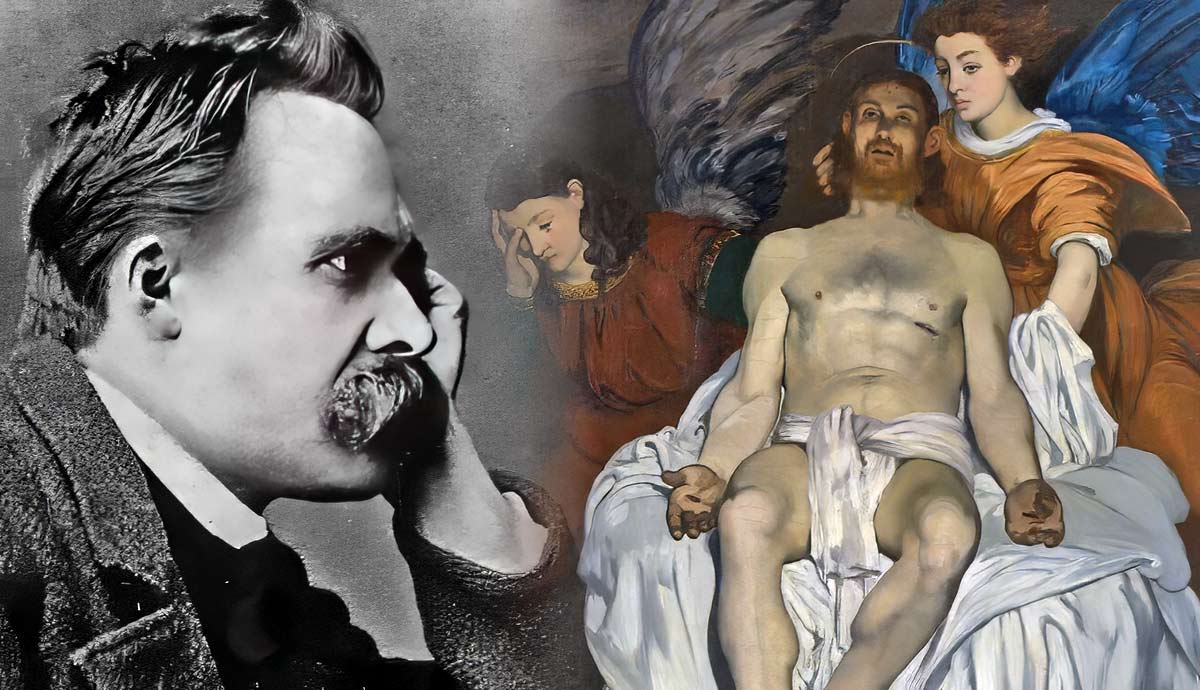
German 19th century philosopher and polemicist Friedrich Nietzsche famously claimed that “God is dead”, in a book called Thus Spoke Zarathustra, 1883, which is often described as a work of philosophical fiction, or theory-fiction. But what did he really mean by this, and what is the significance of Nietzsche’s claim that “God is dead” for those attempting to understand it today? To understand what Nietzsche is really getting at here, it’s essential to delve into the broader context of Nietzsche’s thought.
Western Culture Was Changing

In Thus Spoke Zarathustra, Nietzsche’s ideas are conveyed by a character called Zarathustra, who speaks in ambiguous and seemingly contradictory ways. Thus Nietzsche attempts to get to grips with the ways in which Western culture is changing or has already changed at a time of great societal upheaval, as Enlightenment thinking and the industrial revolution took hold, and the normative structures of society and religion were scattered into disarray. His statement is thereby one of the most widely known and controversial expressions of that change.
It is important to understand Nietzsche’s statement in this philosophical and historical context not as a simple declaration about the existence or non-existence of a divine being, but a profound observation about the shifting cultural landscape and its potential implications for human values and meaning.
Religion Was Becoming Obsolete

Firstly, this is a purely cultural claim. The statement that “God is dead” is not meant to be taken literally as the physical death of a divine being. Instead, it symbolizes a significant shift in Western culture and society, particularly in the realm of religious and moral beliefs. Nietzsche was observing the gradual decline of traditional religious values, and as critical as he was of them, he was equally shocked by the way in which they were being replaced. In particular, the Christian view of the world, of morality and of society was disappearing rapidly, without an equivalent taking its place.
Get the latest articles delivered to your inbox
Sign up to our Free Weekly Newsletter
On the other side, Nietzsche recognized that science, reason, and secularism were all gaining in prominence. Traditional religious beliefs were therefore losing their monopoly on people’s minds and on their ability to shape the way people behave. In the past, religion had played a central role in providing meaning, purpose, and moral guidelines for individuals and society. It was a store of meaning, and touched almost every part of peoples’ lives profoundly. It served as the foundation for a shared understanding of the world and the place of humans within it. However, Nietzsche believed that with the decline of religious belief, there was a danger of a moral and existential vacuum. Without the guidance of a transcendent deity or a divine order, people might face a crisis of values and meaning.
Cultural Values Were Shifting

In this context, “God is dead” becomes a metaphor for the loss of absolute, universal moral truths and the collapse of traditional religious authority. Nietzsche was not celebrating the death of God; rather, he was warning of the potential consequences of a society without a firm moral foundation. He feared that the loss of traditional religious values could lead to nihilism, a state where life is perceived as devoid of intrinsic meaning or value.
Nietzsche’s position on this change in Western culture is ambiguous – even he doesn’t appear to be completely certain about all of the implications of this dramatic shift. On the one hand, the challenge of religion’s decreasing value is also an opportunity. It is an opportunity for individuals to create their own values, to embrace the “Will to Power” (their fundamental drive to be autonomous) and to affirm life on their own terms. Nietzsche always encouraged human beings to act as independent individuals, and for such independent individuals to take responsibility for their own existence, find their own values, and to strive for personal growth and self-overcoming – a kind of resistance to external forces of control.
Nietzsche Deliberately Wrote In a Confrontational Way

Nietzsche’s writing style is one of the most famous and important in Western literature. It was often exaggerated, punchy and over the top; because Nietzsche wrote in a confrontational way, it is important not to let that confound our understanding on what he actually meant. Nietzsche saw himself as a teacher, and sometimes the lesson he is trying to teach us is better learned not by way of a calm, rational discussion, but by throwing things and shouting.
Indeed, Nietzsche’s polemical style can be understood as a reflection of the urgency he felt on the problems he was writing about. Indeed, he felt that Western culture was at a crossroads, and he was desperate for us not to take the wrong path. Nietzsche therefore proclaimed “God is dead” because he wanted us to wake up and realize how fast Western culture was changing, and not necessarily for the better.








